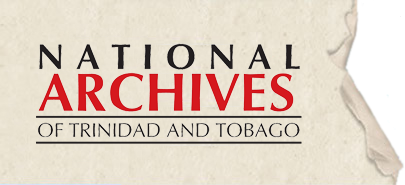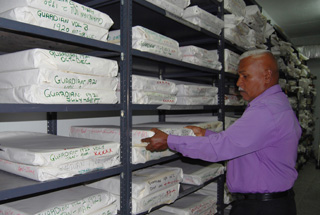 Accessing records
Accessing records
The collection of records held by the National Archives is of enduring historical value, unique and irreplaceable. As such, the collection is secured in humidity and temperature-controlled strong rooms to ensure its preservation for present and future generations. Access to the records in the archive is therefore controlled and systematic, unlike a library where books are easily retrieved from shelves by users.
Records from the collection may be ordered and consulted by visiting our Search Room at our office on 105 St. Vincent Street, Port of Spain, where our knowledgeable staff will be on hand to assist you.
We are happy to receive advance requests to view records or conduct research via telephone, fax or email. There is no charge to view the records.
To ensure the protection of records against loss, damage and mishandling, visitors to the National Archives are required to adhere to Search Room Regulations. Bags, folders, and pens as well as food and drink are not allowed in the Search Room. Lockers are provided for the safekeeping of all personal belongings. Pencils, paper for taking notes, laptops, and cell phones on silent mode are allowed. You are encouraged to bring along a sweater when conducting your research as the temperature of the Search Room must be maintained at optimum conditions for the preservation of records.
|
Opening Hours:
Monday-Thursday 8.15 am-4.00 pm Friday 8.15 am-3.45pm
We are closed on public holidays, some of which are fixed while others are variable. New Year's Day - 1 January Spiritual Baptist Shouter Liberation Day - 30 March Indian Arrival Day - 30 May Labour Day - 19 June Emancipation Day - 1 August Independence Day - 31 August Republic Day - 24 September Christmas Day - 25 December Boxing Day - 26 December The dates for public holidays which are religious observances - Good Friday, Easter Monday, Corpus Christi, Eid-Ul-Fitr and Divali – are selected in accordance with the particular religious calendars and are announced closer to that time.
|
Arrangement of records
The records in the archive are not arranged by subject as in a library, but by the government department, organisation or individual that created them. This arrangement preserves the records' authenticity and value as evidence. The records are also kept in the order in which they were originally created, maintained or used. Having a preliminary understanding of the context of the records - its provenance and original order, will assist in your search for records. For example, Council papers are documents that were laid before the Legislative Council under colonial rule, and were arranged in chronological order. Finding aids and inventories are available to assist in your understanding of how the records originated, how they were kept and arranged, and the kind of information you may retrieve. We continue to develop finding aids to make our collection more accessible.
A small Reference Library which includes a collection of rare books, is available to assist with your secondary research. In addition, the National Archives maintains a special collection of archives and records management publications to support professional development in the respective fields.
Access restrictions
It is important to note that there may be instances when access to records may be restricted. This may occur when records are in a fragile condition, or are being restored in our conservation lab, or when there are specific legal or administrative restrictions to access.
Simple requests for records are entertained via email, fax or telephone. For queries requiring more in-depth research, you are advised to visit our Search Room or engage the services of a researcher from the list of our recommended independent researchers.
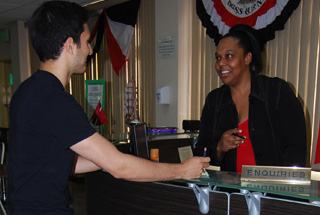 Ordering records
Ordering records
Upon arrival in the Search Room and once cleared by Security, visitors are required to register at the Reference Desk by completing a Research Application Form. This form records personal contact information, the area of research and type of records being requested. If you require guidance on the kind of records to be consulted for your research, the Reference Desk staff will conduct a short interview with you to determine your specific research needs.
Once the Research Application Form is completed, your request will be forwarded to the Vault Attendant, who will retrieve the record, on a first-come, first-serve basis.
You are required to fill out a form for each visit, one per day.
No more than three items are allowed for use at a time.
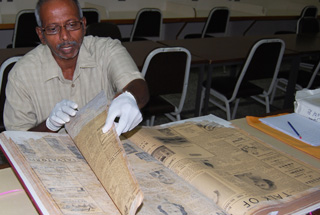 Handling records
Handling records
As constant handling of records renders them vulnerable to damage and loss of information they contain, regular monitoring is done by Search Room staff to ensure that records are being handled in accordance with Search Room Regulations, some of which include:
- the use of gloves when handling all documents;
- the use of book cushion under the cover of opened books;
- no leaning or pressing on records;
- no marking or annotating of records;
- the use of pencils for taking notes
- not interfering with the original order of papers within a file.
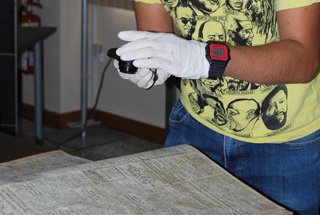 Copying records
Copying records
You may order copies of records in the Search Room but the decision to copy is informed by guidelines, rules and legislation.
A. Photocopying /Scanning
The decision to photocopy is first determined by the condition of the record. Records that are too fragile or too large will not be photocopied or scanned since our prime responsibility is the preservation of the records. Once the records are deemed to be in good condition to withstand photocopying or scanning, the request for copies must not in any way infringe the Copyright Act 1997.
Section 8 of the Copyright Act clearly grants the copyright owner "to do, authorize or prohibit" the reproduction of his/her work. The permission of the copyright owner is thus required for the photocopying of a work except in the following circumstances:
- Private reproduction of a single copy by a person for personal purposes.
- The quotation of a short part of a published work provided that the source and the name of the author is indicated if appearing on the work.
- Reproduction of a short part of a published work for teaching purposes by way of illustration, in writing or sound or visual recordings.
- Reproduction for face to face teaching in educational institutions that do not serve direct or indirect commercial gain provided that there is no collective licence available and the act of reproduction occurs in isolated, separate, unrelated occasions.
- Reproduction of a single copy for use in libraries or archives provided that there is no collective licence available and the act of reproduction occurs in isolated, separate, unrelated occasions.
- Reproduction for broadcasting, newspaper reporting and other communications to the public for informatory purposes.
In all other circumstances, it is an offence to photocopy a work without permission.
Each researcher is allowed five photocopies per day. If however, the researcher requires more than five copies, he/she will be required to complete the Reproduction Application Form and provide white, blank sheets of copy paper. Paper tags will be provided for flaging pages to be copied.
B. Use of cameras
Researchers are permitted to use their cameras, whether in the form of a cell phone, tablet or conventional camera, to photograph pages of a document. However, flash photography is strictly prohibited.
Permission to photograph must first be sought by completing the Reproduction Application Form at the Reference Desk. This form captures information such as the method of reproduction, the title of records and the pages photographed, and requires the researcher to sign the declaration as it relates to the Copyright Act. Hand scanners are not allowed.
Certifying records
The National Archives accommodates requests from the public to have records that are contained in its holdings certified. The standard time for the certification of a record is three (3) working days. The Application for a Certified Copy of Record Form must be completed.
Permission to publish records
Archival records are subject to copyright laws and cannot be published without special permission from the Government Archivist. A formal letter requesting permission to publish records should be sent to the Government Archivist, detailing the following information:
- the name of the applicant and name of the organization;
- the purpose and format of the publication or production;
- the nature and title of the publication or production;
- its intended use; and
- the description of records that would be required and the list of persons who will conduct the research.
Approval from the Government Archivist must be granted before proceeding to film or photograph records. Once approved, a letter will be sent to the applicant stipulating the conditions under which publishing is to be undertaken. For example, the reproduction of the records used in publications should be accompanied by a full citation of the source, records should be used only for the stated purpose that was approved, credit should be given to the National Archives and a copy of the final publication should be lodged at the National Archives.


